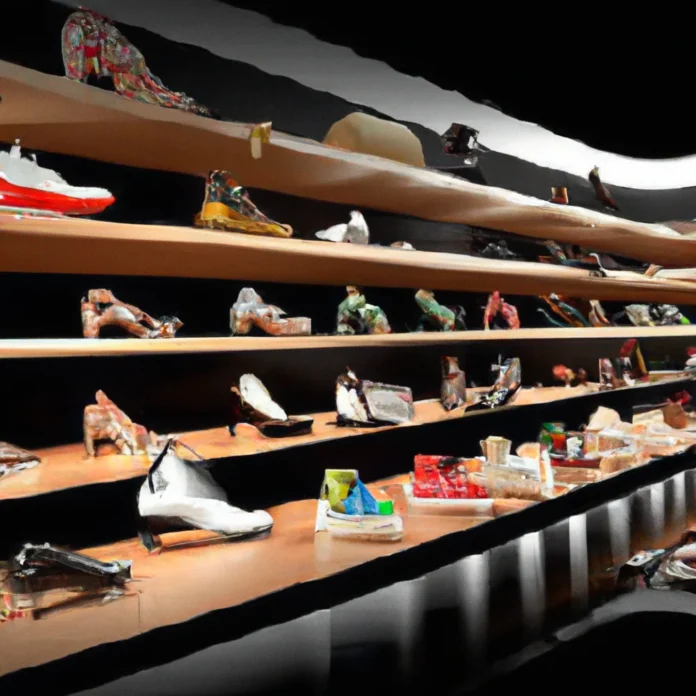Introduction: The Allure of Expensive Shoes
The fascination with expensive shoes is undeniable. Whether displayed in glimmering storefronts or showcased on red carpets, these high-priced pieces often signify exclusivity, status, and personal taste. For many, the tactile pleasure of soft leather, the gleam of hand-burnished finishes, and the distinct aroma of quality craftsmanship create a sensory experience that goes far beyond mere function. But does the price truly reflect the value, or is the allure simply part of a sophisticated marketing strategy?
In this article, we examine what sets costly shoes apart, explore their merits and myths, and help readers determine if they genuinely live up to the hype.
What Defines an ‘Expensive’ Shoe?
Defining what makes a shoe “expensive” is more complex than looking at a price tag. The designation typically encompasses factors like brand prestige, materials, construction methods, and exclusivity. Understanding these elements helps us appreciate the true meaning behind a shoe’s cost.
How Much Do Expensive Shoes Really Cost?
When we talk about expensive shoes, the spectrum is vast. For some, spending a few hundred dollars on a pair is extravagant; for others, the threshold starts in the thousands. Entry-level luxury shoes from respected brands may start around $500, but truly exclusive pairs—such as those adorned with precious metals or stones—can reach six or even seven figures. As explored in our post about the most expensive shoes in the world, some creations are designed more as art than as everyday wear.
Price Ranges: Luxury vs. Designer vs. Premium
The world of high-priced footwear can be divided into several categories:
- Luxury: Often handcrafted, limited in quantity, and priced from $1,000 to over $100,000.
- Designer: Produced by well-known fashion houses, typically ranging from $500 to $2,000.
- Premium: High-quality materials and construction, but not always branded, usually $200 to $500.
Each segment offers its own blend of exclusivity, craftsmanship, and aesthetic appeal.
Popular Brands Known for Expensive Shoes
Certain brands dominate the conversation when it comes to high-priced footwear. Their reputations are built on heritage, innovative design, and celebrity endorsements.
Luxury Fashion Houses
Brands like Christian Louboutin, Jimmy Choo, and Manolo Blahnik are synonymous with luxury. Their shoes are instantly recognizable, thanks to signature design elements such as Louboutin’s red soles or Blahnik’s sculptural heels. These fashion houses often produce limited runs, driving demand and maintaining an air of exclusivity.
High-End Sneaker Brands
The sneaker market has seen a surge in high-value releases. Brands such as Nike and Adidas collaborate with designers and celebrities to create limited-edition sneakers that fetch astronomical prices on the resale market. Our article on the most expensive sneakers delves into the cultural and financial impact of these coveted kicks.
Artisan and Bespoke Shoemakers
Traditional shoemakers like John Lobb, Edward Green, and George Cleverley focus on bespoke and made-to-order shoes. These artisans use time-honored techniques, offering unparalleled fit and finish. Bespoke shoes can require dozens of hours to craft and may cost several thousand dollars, reflecting the expertise involved.
What Makes Expensive Shoes Different?
Beyond branding and price, several tangible factors contribute to what sets expensive shoes apart: materials, craftsmanship, and design. Evaluating these aspects helps clarify whether the investment is justified.
Materials: Are They Truly Superior?
The quality of materials used in expensive footwear often distinguishes them from mass-market alternatives. Superior leathers, rare exotics, and innovative fabrics are hallmarks of luxury shoes.
Leather Types and Quality
Premium shoes typically use top-grade full-grain or calfskin leather. These materials are supple to the touch, develop a beautiful patina with age, and offer breathability that enhances comfort. Inferior leathers, by contrast, often feel stiff and may deteriorate rapidly.
Exotic Materials: Alligator, Ostrich, and More
Some luxury shoes incorporate exotic skins such as alligator, ostrich, or python. These materials provide unique textures and visual appeal, but they also require specialized skills to work with. The rarity and difficulty of sourcing these leathers contribute significantly to the cost.
Innovative Fabrics and Technologies
Modern high-end brands are increasingly integrating advanced textiles and technologies. Examples include memory foam insoles, moisture-wicking linings, and lightweight carbon fiber components. These innovations can dramatically improve both comfort and performance.
Craftsmanship: The Art Behind the Shoe
Expert craftsmanship is another defining trait of expensive shoes. The meticulous attention to detail, from hand-stitching to lasting, creates shoes that feel like wearable works of art.
Handmade vs. Machine-Made
Handmade shoes are often constructed by skilled artisans who devote hours to each pair. This approach allows for custom adjustments, precise finishing, and unique character. Machine-made shoes, while more affordable, generally lack the nuanced construction found in handmade options.
Attention to Detail and Finishing
Luxury footwear is distinguished by features such as hand-burnished edges, perfectly aligned patterns, and subtle branding. Even the inside of the shoe—often overlooked in cheaper pairs—receives careful finishing for enhanced comfort and longevity.
Design: Originality and Aesthetics
Design innovation is a hallmark of expensive shoes. Whether reimagining classic silhouettes or pushing boundaries with bold concepts, high-end brands set trends that ripple through the fashion world.
Signature Styles and Limited Editions
Many brands become iconic thanks to signature styles or limited-edition releases. These shoes may feature unique colorways, special logos, or intricate embellishments, making them highly sought after by collectors and enthusiasts alike. Our review of the top 10 expensive shoes in the world in 2025 highlights some of the most notable examples.
Collaborations and Artist Partnerships
Partnerships with artists, designers, and celebrities often result in highly creative footwear. These collaborations produce limited runs, blending diverse perspectives and raising the cultural cachet of the shoes.
Comfort and Fit: Is There a Noticeable Difference?
One of the most debated topics is whether expensive shoes genuinely provide superior comfort and fit. The answer often depends on construction methods and individual preferences.
Ergonomics and Support Features
Luxury shoes frequently incorporate anatomical insoles, arch support, and cushioned midsoles. These features can significantly enhance comfort, especially during extended wear. Premium brands may also offer multiple width options to accommodate different foot shapes.
Customization and Bespoke Fitting
Bespoke shoemakers craft shoes to the precise measurements of the wearer, resulting in a fit that feels both secure and effortless. This level of personalization is rarely found in mass-produced footwear and can transform the wearing experience.
Durability: Do Expensive Shoes Last Longer?
Longevity is a key argument in favor of investing in high-priced shoes. The question remains: do they actually outlast their less expensive counterparts?
Construction Techniques That Enhance Longevity
Techniques such as Goodyear welting and Blake stitching allow shoes to be resoled multiple times, extending their lifespan. Reinforced stitching, high-quality adhesives, and robust shanks contribute to structural integrity.
Sole Quality and Replacement Options
Luxury brands often use leather or high-grade rubber soles that offer both comfort and durability. Many also provide resoling services, allowing customers to refresh their shoes rather than replace them entirely.
How to Maintain Expensive Shoes for Maximum Lifespan
Proper care is essential for preserving the value of expensive footwear. This includes regular cleaning, conditioning, and storage in cool, dry conditions. Investing in shoe trees and dust bags can further protect against creases and moisture damage.
Are Expensive Shoes Worth the Investment?
Determining whether high-priced shoes are a worthwhile investment depends on both tangible and intangible factors. From cost per wear to emotional satisfaction, each person’s calculation will differ.
Cost Per Wear: Breaking Down the Math
One useful metric is the “cost per wear,” which divides the purchase price by the number of times the shoes are worn. A $1,000 pair that lasts for years and remains a wardrobe staple may ultimately prove more economical than several cheap pairs that quickly wear out.
Resale Value and Collectibility
Some shoes—particularly limited editions and collaborations—retain or even appreciate in value over time. The thriving secondary market for rare sneakers and designer pieces offers opportunities for collectors and investors. For those interested in this aspect, our feature on the most expensive Nike shoes provides further insight.
Emotional Value and Personal Satisfaction
The pleasure of owning something special, the confidence boost of wearing beautifully crafted shoes, and the pride in acquiring a unique piece all contribute to the intangible value of luxury footwear.
Expensive Shoes as Status Symbols
For many, expensive shoes serve as visible markers of status and success. The psychological and social effects of luxury footwear are complex and far-reaching.
Celebrity Endorsements and Influence
Celebrity endorsements elevate certain brands to cult status. When high-profile figures are seen wearing specific shoes, demand can skyrocket almost overnight. This phenomenon drives both sales and resale values in dramatic ways.
Social Media Trends and Hype Culture
Platforms like Instagram and TikTok have amplified hype culture. Limited releases and “drops” are promoted to a global audience, fueling demand and creating frenzied buying sprees. The scarcity factor only adds to the allure.
Psychology of Luxury Purchases
As experts often say:
“Luxury is not about the price tag, but about the feeling it evokes—the sense of belonging to an exclusive club, the thrill of owning something that few can attain.”
This emotional connection often motivates consumers to pay premiums for status-driven purchases.
Do Expensive Shoes Improve Your Style?
Many fashion-conscious individuals believe that quality footwear can elevate an entire outfit. But do luxury shoes really make a difference in personal style?
How to Style Luxury Footwear
Styling high-end shoes often involves showcasing them as statement pieces. Pairing bold sneakers with minimal outfits or letting elegant heels take center stage can create a polished, intentional look. Attention to proportion, color, and context is crucial for maximum impact.
Do They Make a Noticeable Impact on Outfits?
Well-chosen luxury shoes can transform even the simplest attire. The fine details—such as hand-burnished leather or unique hardware—catch the eye and signal refined taste. Friends and colleagues may notice the difference, even if they cannot pinpoint why.
Can You Spot the Difference? Expert Opinions
Seasoned stylists and collectors often point to subtle distinctions in silhouette, stitching, and finishing. These nuances, while easily overlooked by the untrained eye, contribute to an overall impression of sophistication. For more on this topic, see our article unveiling the truth behind the most expensive shoes today.
Are Expensive Shoes More Sustainable?
The environmental impact of footwear production is receiving increased scrutiny. Many luxury brands are responding by adopting more sustainable practices.
Eco-Friendly Materials in High-End Footwear
Some companies now use vegetable-tanned leathers, recycled rubber, and organic cotton. These materials can reduce the carbon footprint and environmental harm associated with traditional shoe manufacturing.
Ethical Production Practices
High-end brands are more likely to maintain ethical labor standards, including fair wages and safe working conditions. Transparency in sourcing and manufacturing is becoming a selling point for conscious consumers.
Longevity vs. Fast Fashion
While the initial investment is higher, luxury shoes are designed to last. This durability can offset the wastefulness of disposable, fast-fashion alternatives, supporting a more responsible approach to consumption.
Common Myths About Expensive Shoes
Misconceptions abound when it comes to luxury footwear. Here, we address some of the most persistent myths.
Myth 1: All Expensive Shoes Are Uncomfortable
While some designer shoes prioritize aesthetics over ergonomics, many high-end brands invest heavily in comfort technology. Bespoke and premium shoes are often tailored to the wearer’s foot, resulting in a superior fit.
Myth 2: Price Always Reflects Quality
Not all costly shoes are created equal. Brand reputation and marketing can inflate prices without corresponding improvements in materials or craftsmanship. Researching construction details and reviews is essential before making a purchase.
Myth 3: Only Celebrities Wear Luxury Shoes
While celebrities are often seen in the latest designer releases, many enthusiasts, professionals, and collectors also invest in high-quality footwear for personal enjoyment and self-expression.
Real Customer Experiences: Do Expensive Shoes Live Up to Expectations?
Testimonials and case studies offer valuable insight into the real-world value of expensive shoes.
Testimonials from Shoe Enthusiasts
Enthusiasts frequently describe the satisfaction of wearing shoes that combine comfort, style, and durability. Many highlight the confidence boost and positive attention they receive.
Case Studies: Everyday Wearers
Individuals who wear luxury shoes daily often report fewer issues with discomfort and premature wear. They appreciate the long-term value and the sense of pride that comes with owning something special.
Expert and Influencer Reviews
Influencers and experts tend to focus on nuanced features such as stitching quality, leather suppleness, and arch support. Their reviews can be invaluable for prospective buyers seeking honest opinions.
Comparing Expensive Shoes to Affordable Alternatives
Direct comparisons between luxury and budget shoes reveal both strengths and trade-offs.
Side-by-Side Quality Analysis
Expensive shoes frequently excel in construction, material quality, and fit. However, some affordable brands offer impressive value, particularly for those willing to forgo branding or exclusivity.
Style and Comfort Comparisons
While luxury shoes can offer unique designs and superior comfort, well-chosen affordable options can still provide an attractive and functional wardrobe staple. Ultimately, priorities such as fit, appearance, and intended use should guide the decision.
When Is It Worth Splurging on Shoes?
Knowing when to invest in expensive footwear is a personal decision, influenced by occasion, lifestyle, and budget.
Occasions That Justify the Investment
Special events—such as weddings, milestone celebrations, or career advancements—may warrant the purchase of high-end shoes. These occasions often call for standout style and exceptional comfort.
How to Choose the Right Pair for You
Consider factors such as fit, versatility, and care requirements. Prioritize shoes that complement your wardrobe and offer the best balance of aesthetics and practicality.
Tips for Shopping Smart: Getting the Most Value
Maximizing value when purchasing expensive shoes requires careful attention to authenticity, pricing, and aftercare.
Where to Buy Authentic Expensive Shoes
Authorized retailers, brand boutiques, and reputable online platforms are the safest sources for genuine luxury footwear. Buying from these outlets reduces the risk of counterfeit products.
Spotting Fakes and Avoiding Scams
Check for details such as stitching quality, logo placement, and packaging. Serial numbers and certificates of authenticity can also help verify genuine products.
Sales, Outlets, and Secondhand Options
Luxury outlets and seasonal sales can offer significant savings. Secondhand marketplaces provide access to rare or discontinued styles, often at a fraction of the original price.
Caring for Your Investment: Shoe Maintenance Tips
Proper maintenance is essential for preserving the appearance and longevity of expensive shoes.
Proper Storage Techniques
Store shoes in a cool, dry place away from direct sunlight. Use shoe trees to maintain shape and minimize creasing, and keep dust bags handy for travel or long-term storage.
Cleaning and Conditioning High-End Materials
Use pH-balanced cleaners and conditioners suitable for the specific material—be it leather, suede, or exotic skins. Gentle brushing and regular conditioning prevent drying and cracking.
When to Seek Professional Shoe Care
For complex repairs or deep cleaning, consult a professional cobbler experienced in luxury footwear. They can restore soles, replace linings, and address stains without compromising the shoe’s integrity.
The Future of Expensive Shoes: Trends to Watch
The luxury footwear landscape is evolving, with exciting new trends shaping the future of high-end shoes.
Smart Shoes and Wearable Tech
Brands are integrating smart features such as step tracking, temperature regulation, and adaptive fit technology. These innovations promise to redefine comfort and functionality.
Sustainability Innovations
Eco-friendly materials, circular production models, and zero-waste manufacturing are gaining traction in the luxury sector. These practices appeal to a growing segment of environmentally conscious consumers.
Customization and Personalization Trends
Personalization options—from monogramming to bespoke colorways—allow buyers to create shoes that reflect their unique style and preferences. This trend enhances both the exclusivity and emotional value of high-end footwear.
Conclusion: Do Expensive Shoes Really Live Up to the Hype?
For some, the answer is a resounding yes: the blend of superior materials, expert craftsmanship, and emotional satisfaction offers genuine value. For others, the price may exceed the practical benefits. Ultimately, the decision comes down to personal priorities, lifestyle, and appreciation for the artistry involved.
At Autoxite, we believe that informed choices lead to greater satisfaction, whether you’re seeking a timeless classic or the latest limited edition. To learn more about luxury footwear, trends, and expert advice, visit Autoxite.
FAQs About Expensive Shoes
How Can I Tell If Expensive Shoes Are Worth It?
Assess the quality of materials, construction methods, and brand reputation. Read reviews, try on multiple pairs, and consider the “cost per wear” to determine if the investment aligns with your expectations and lifestyle.
What Are the Most Overrated Expensive Shoe Brands?
Some brands command high prices based primarily on marketing and celebrity endorsements rather than superior quality. Researching construction details and independent reviews can help you avoid overhyped options.
Can You Find Affordable Shoes with Similar Quality?
Yes, some lesser-known brands and direct-to-consumer companies offer impressive quality at more accessible price points. Focus on craftsmanship and materials, and you may find shoes that rival luxury options without the hefty price tag.


